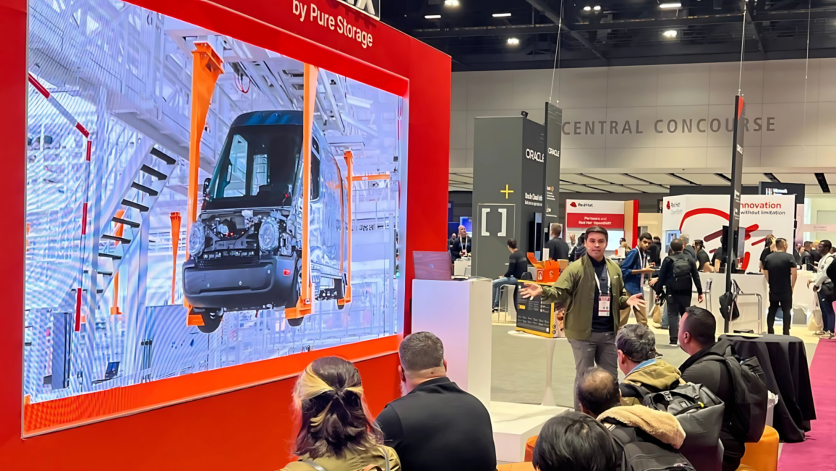
In today's world of artificial intelligence and robotics, building the invisible systems that make big ideas possible often matters as much as the breakthroughs themselves. Few engineers know this better than Royer Ramirez Ruiz, a Staff Engineer at Maven Robotics. His career has taken him from scaling electric vehicle production at Rivian to architecting global browser infrastructure at Browserbase, and now to the frontier of general-purpose AI robots. This is the story of the engineer who helped lay the foundations for three fast-growing industries: electric vehicles, global-scale cloud systems, and general-purpose AI robotics.
Scaling America's Electric Vehicle Revolution
Ramirez Ruiz played a key role during Rivian's rise as one of the United States' first large-scale electric vehicle manufacturers. When he joined, the company had produced fewer than 200 vehicles. By the time he left, production had crossed 100,000 units across the R1T, R1S, and EDV models.
At Rivian's Normal, Illinois, factory, he bridged the gap between software, networking, and manufacturing. "I was at the forefront of building the factory of tomorrow," he recalls. His systems allowed quality, supply chain, and operations teams to move from manual spot checks to continuous, data-driven decision-making.
One of his most notable contributions was deploying edge AI models to validate laser welds on battery submodules. "The battery is the heart of every EV," he explains. "Any defect in welding could compromise safety. We needed real-time validation to catch problems before they left the line."
This early use of AI in battery manufacturing set a new standard. It improved quality, increased safety, and demonstrated how AI could reshape modern factories.
Building Infrastructure at Browser Scale
After Rivian, Ramirez Ruiz shifted to a different challenge: scaling Browserbase, a platform for browser-driven AI agents. As the company's first dedicated infrastructure engineer, he designed a system that grew from one region to a global network spanning the United States, Europe, and the Asia Pacific.
"I designed a proprietary architecture that expanded the platform worldwide, cutting latency and improving resilience," he says.
That foundation helped position Browserbase for rapid growth while also achieving SOC 2 and HIPAA compliance in just one month. Balancing regulatory requirements with global scale highlighted his ability to combine technical rigor with enterprise needs.
Leading the Next Wave of Robotics
Today, Ramirez Ruiz leads infrastructure at Maven Robotics, a company developing general-purpose AI robots. Unlike traditional robots built for one task, Maven's robots are designed to adapt, collaborate with humans, and work across industries.
"We're designing and scaling the infrastructure to support the most capable general-purpose AI robots," he explains.
His work spans global access, security and compliance, reliability at the edge, and cost-efficient scaling. Each of these challenges must be solved before autonomous robots can operate safely in everyday environments.
Bridging Data Science and Infrastructure
What makes Ramirez Ruiz stand out is his ability to integrate data science and infrastructure. "I align model goals with platform realities from day one," he says. His joint design sprints with data scientists and engineers map out interfaces, data schemas, service level agreements, and capacity planning before development begins. This approach prevents rework and ensures faster, more reliable deployments.
Sharing Knowledge on a Global Stage
In 2023, Ramirez Ruiz presented his work to a global audience at KubeCon + CloudNativeCon, where he spoke on operating production databases for smart factories at scale. His talk reached thousands of engineers and industry leaders, including those from major automotive and industrial robotics companies.
"We showed that American companies could scale EV manufacturing," he reflects. "And the patterns we built became blueprints others could learn from."
Following his KubeCon presentation, engineers from across the AI, automotive, and robotics sectors reached out to discuss the infrastructure patterns he had developed. Several companies later cited Royer's work as a reference point for their own factory data platforms or robotics deployments.
"We weren't just solving problems for one company," he notes. "We were helping define what scalable, intelligent infrastructure could look like across the entire industry."
Building Tomorrow's Industry
By linking his experience in electric vehicles, global infrastructure, and robotics, Ramirez Ruiz has built a rare skill set. Research from the Manufacturing Leadership Council shows that more than half of manufacturers already use AI in operations, and most expect to increase investment by 2027. His work positions him at the center of this shift.
"Whether it's electric vehicles or autonomous robots, you need infrastructure that can handle real-time data, support AI, and grow with demand," he says.
From helping Rivian scale to over 100,000 vehicles, to enabling Browserbase's global reach, and now powering Maven Robotics' vision of general-purpose AI robots, Ramirez Ruiz has consistently engineered the foundations for industries in transition. His journey reflects the quiet but crucial role of infrastructure in shaping the future of technology.
ⓒ 2025 TECHTIMES.com All rights reserved. Do not reproduce without permission.




